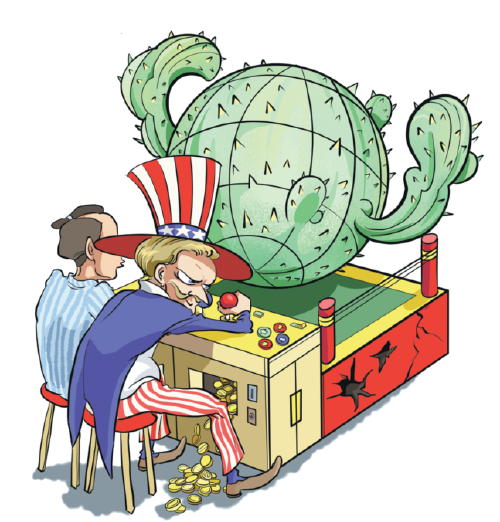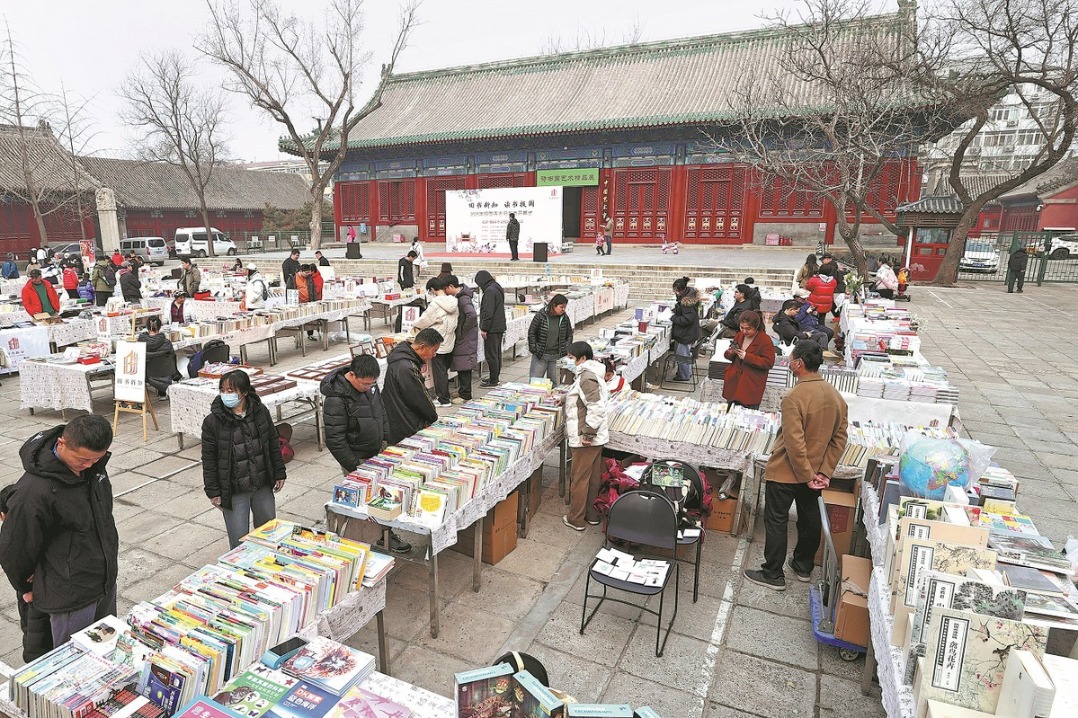False alarm


The world has not entered an era of strategic competition, as China will not be dragged into such zero-sum games
Change and turmoil are the two evolving trends in the world today, and unity and division are the two orientations continuing to confront each other. A joint statement released after the convening of the 2023 US-Japan Security Consultative Committee, attended by senior diplomats and defense ministers from the two countries, claimed that the world has entered "a new era of strategic competition". This means that Washington and Tokyo are trying to impose "strategic competition" not only on China, but also on the world.
In the discourse of the United States, the term "strategic competition" does not refer to normal, reasonable and orderly interactions, but specifically refers to maintaining and safeguarding the legitimacy of US values, ideology and interests, which involves attacking, containing and even suppressing so-called opponents who practice different values and systems and have the ability to challenge it. The first "Indo-Pacific Strategy Report "issued by the US Department of Defense in May 2019 defined strategic competition as "geopolitical rivalry between free and repressive world order visions". The China strategy of the Joe Biden administration has completely followed the concept of "strategic competition "proposed during the Donald Trump era.
The Interim National Security Strategic Guidance released by the Joe Biden administration in 2021, and the National Security Strategy and National Defense Strategy released in October 2022 all included strategic competition as the most important concept, course of action and target for the national security strategy of the US in the future. Whether at home or abroad, Biden, and core members of his core diplomatic and strategic team, regard peddling strategic competition plans and enlisting the support from allies and partners for the implementation of such plans as the top priority for US diplomacy. One year after the Ukraine conflict broke out, the Biden administration has repeatedly emphasized that China is the US' biggest strategic competitor because it believes China possesses both the ability and the intent to change the so-called rules-based international order established by the US in its favor.
The joint statement issued by the US and Japanese officials in January was the first time that the US announced in a diplomatic document that the world has entered "a new era of strategic competition".On the one hand, this reflects the so-called special relationship between the US and Japan. Japan is not only a long-term and ironclad ally of the US in the "Indo-Pacific "region, but also the most staunch follower of the US in implementing its strategic competition policy toward China.
The government of Fumio Kishida has now completely abandoned Japan's defense-oriented security strategy and has made every effort to expand the scale of Japanese military expenditure and is equipping the country's armed forces with offensive weapons. Through the joint statement from the US-Japan Security Consultative Committee, Washington is applauding the move by Tokyo and setting the stage for future joint military deterrence operations related to China and even military intervention on regional hotspot issues in the Asia-Pacific, including the Taiwan question. The Kishida government will expand Japan's military spending to 2 percent of its total GDP within three years. This is not only what the US wants, but also a political bargaining chip to sweep away domestic opposition voices.
Is the world really entering an era of "strategic competition "among major powers? The answer is No.
First, China has consistently and steadfastly rejected strategic competition as defined by the US and Japan. Xi Jinping Thought on Diplomacy has always emphasized that relations between countries are by no means zero-sum games. China advocates the building of a new type of major-country relations. Beijing has underscored that, despite different values and institutional practices between countries, the most important is to avoid conflicts and confrontations and practice mutual respect and win-win cooperation based on the vision of building a community with a shared future for mankind. As the world's largest and second-largest economies, competition between the US and China is inevitable. But what is important is to conduct orderly and rules-based competition, and more importantly, based on the common interests of mankind. The essence of China-US competition is to promote world security, peace and prosperity, and continue to enhance the common interests of the two peoples and the international community.
Second, under the shocks from the COVID-19 pandemic, the global climate crises, extremism and the downturn in the global economy, any move by major powers to reduce substantive cooperation and resort to bloc confrontation and international division will only further aggravate the impact of various global issues facing the sustainable development of mankind. The self-interest of the hegemonic country should give way to the pursuit of common and sustainable development for mankind. The United Nations Conference on Trade and Development has lowered its growth forecast for the world economy in 2023 to 1.9 percent. The possibility for the global economy to fall into a recession cannot be ignored after a pandemic that has lingered for three years and the repercussions from the Ukraine conflict. As three of the world's major economies, the US, China, and Japan should bolster cooperation, strengthen solidarity, and jointly shoulder the responsibility of major countries to promote global political stability and economic growth. However, the joint statement by senior US-Japan officials turned a blind eye to the current global economic situation, and put their paranoid and narrow-minded propositions above the common development of mankind. Will the international community concur with such behavior?
Third, taking history as a mirror and looking to the future is the common lesson for the stability and development of China-US and China-Japan relations. Former US president Richard Nixon and then Japanese prime minister Kakuei Tanaka made successive visits to China over 50 years ago, charting a new course for relations between China and the two nations. Over the past five decades, Asia has not only emerged as a key powerhouse for the world economy, but also become the most peaceful region in the world. Today, Washington and Tokyo are plotting to prevent the historical process of China's rise and disrupt the momentum for sustained peace, stability and prosperity in East Asia. Do the US and Japan really want to turn Asia into Europe as it was during the Cold War or "Europeanize" the Asia-Pacific region? This is not only turning back the wheel of history, but also an attempt to repeat the tragedy of history in Asia.
It is the purpose and principle of major-country diplomacy with Chinese characteristics to oppose bloc confrontation and zero-sum games, and to maintain the strategic stability of major-country relations. In the face of confrontational geopolitical strategy adopted by the US, Japan and other countries, China must maintain its composure and act righteously and firmly. The nation must not only firmly oppose hegemony and bullying actions, but also work together with all members of the international community to advance humanity's common values of peace, development, equity, justice, democracy and freedom, promote world peace and development, promote the building of a community with a shared future for mankind, and jointly work toward a better future for the international community. The world will not enter the era of strategic competition precisely because of Chinese strength and Chinese voices.
The author is dean of the School of International Studies at Nanjing University. The author contributed this article to China Watch, a think tank powered by China Daily. The views do not necessarily reflect those of China Daily.
Contact the editor at editor@chinawatch.cn
































